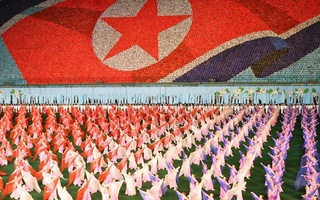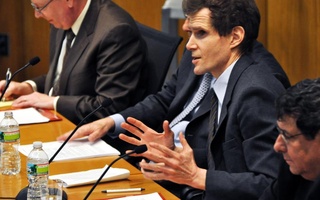Beginning on Tuesday, members of Harvard Human Rights in North Korea (HRiNK) will fast for 31 hours to raise awareness about the 31 North Korean defectors recently repatriated by the Chinese government. The defectors face imprisonment, forced labor, and possible execution in their native country.
For HRiNK co-president Rainer A. Crosett ’14, the fast is an opportunity to correct Harvard students’ misconceptions about North Korea.
“They have the image of the Kim family, you know, and nuclear weapons,” he said. “People don’t actually know that there are, for example, 200,000 people living in concentration camps.”
Crosett added that the organized fast highlights the daily reality of famine and food shortages for many North Koreans.
“I think it’s a wonderful idea because the experience of so many of the North Korean people and refugees is one of intense hunger,” he said.
HRiNK co-president Stephanie Choi ’13 said that the latest defections do not represent isolated incidents. She added that many North Koreans have previously risked imprisonment, torture, and death to reunite with loved ones in South Korea and escape oppression.
“This happened, and it’s not the first time it happened,” Choi said.
Fast participant and HRiNK member Ji Su Yoo ’15, who was inspired to become involved by her Korean heritage and Christian faith, said that the experience is also deeply personal.
“It has to do with awareness and it has to do with making myself more aware,” she said. “It’s about ignoring yourself, ignoring physical needs, to focus on more important things.”
The 31-hour fast is part of a series of events this week organized by HRiNK to raise awareness about North Korean human rights abuses, including a screening of the South Korean film “Crossing.” The film depicts a man who crosses illegally into China to buy medicine for his pregnant wife. The fast will conclude on Wednesday with a closing discussion featuring Professor Justin Jeon of Yonsei University and Jeong Young, a defector who is now a journalist for Radio Freedom Asia.
According to Crosett and Choi, the death of dictator Kim Jong Il presented a unique opportunity for activists to tackle the issue of human rights abuses in North Korea. Both HRiNK co-presidents said that they remained optimistic that non-governmental actors could bring about change and added that donations from the fast will be given to Love North Korean Children, an NGO that runs charity bakeries in the country and delivers food directly to North Korean citizens.
For Yoo, fostering a global perspective among future policy-makers at Harvard is also a major goal of HRiNK’s work.
“Everything is global. We can’t just look at our own issues, but see how everything is connected,” Yoo said. “North Korea is not so far away.”
Read more in News
HBS Prof. Publishes Book on Start-UpsRecommended Articles
-
 General Rebukes Kim Jong Il
General Rebukes Kim Jong Il -
 Behind the Bamboo Curtain: Students Hop Over to Pyongyang
Behind the Bamboo Curtain: Students Hop Over to Pyongyang -
Moore Aims for Chance in LondonFreshman Schuyler Moore dedicated much of her childhood and adolescence to the world of gymnastics in pursuit of that lofty goal. But she never would have expected that eleven years later, she would be looking to compete in the Games in a different discipline entirely.
-
Panel Discusses the Relationship of China and North KoreaJohn S. Park, a fellow at the Harvard Kennedy School and Senior Program Officer at the U.S. Institute of Peace, discussed China’s economic engagement with North Korea last night.
-
 Panel Evaluates North Korea
Panel Evaluates North Korea -
Sisterly Bond Holds Strong in 'You For Me For You'In their homeland of North Korea, two sisters struggle to make the difficult decision between remaining faithful to their country ...













